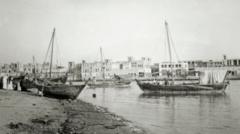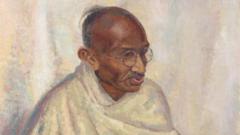In the mid-20th century, the Arabian Peninsula was significantly intertwined with British India, with Dubai among the territories linked to the British Raj. This historical tidbit has faded from collective memory as the Gulf states, now independent, have shifted narratives to emphasize their autonomy over colonial ties. This article delves into the intricate history of administrative decisions that severed these connections and their lasting legacy on regional identity.
The Forgotten Legacy: Dubai’s Connection to British India

The Forgotten Legacy: Dubai’s Connection to British India
A retrospective on Dubai's historical status as part of the British Indian Empire and the implications of this overlooked connection on contemporary Gulf and Indian identities.
In the winter of 1956, journalist David Holden found himself in a unique Arabian setting: Bahrain, then a British protectorate. Uninformed about the depth of British Indian influence, he described how remnants of the Raj pervaded the Gulf states, from Dubai and Abu Dhabi to Oman. The customs and culture echoed the colonial legacy, with local servants adopting traditional Indian roles and the Sultan of Oman fluent in Urdu.
At that time, almost a third of the Arabian Peninsula was governed as part of the British Indian Empire. This arrangement featured a crescent of protectorates under the British Indian administration, still regarded as part of India legally. Indian political and military presence was prevalent, with regions like Aden, recognized as a critical western port, administering the flow of resources and politics.
However, public awareness of this imperial extension was minimal, as British officials kept the Arabian territories out of published maps, a strategy meant to prevent tensions with regional powers like the Ottomans or Saudis. With shifting political dynamics in the 20th century, a new vision of India began to emerge, one rooted in national identity rather than imperial legacy. The partitions commenced in 1937 when Aden was formally severed from British Indian governance.
As independence approached in 1947, British discussions on the future of the Gulf states found little interest from Indian nationalists, and responsibility for the region was ultimately set aside for local governance options. Therefore, the Gulf states disengaged from India and Pakistan's political integration, an oversight that has yet to be fully comprehended.
British Prime Minister Clement Attlee faced resistance to withdrawing from the Gulf, extending Britain's colonial influence for another 24 years. Despite the Indian rupee remaining in use and governance operating under the old systems, this final vestige of the Raj would cease with Britain's departure in 1971.
In the ensuing decades, Gulf states like Dubai redefined their national narratives, minimizing their British Indian connections. Today, despite the presence of millions of Indian expatriates, many remain unaware of the former ties and the socio-economic reversals that now characterize Gulf society. The complex history serves as a ghostly reminder of a time when the Gulf states might have aligned with India and Pakistan, a legacy that quietly endures in echoes of the past.






















